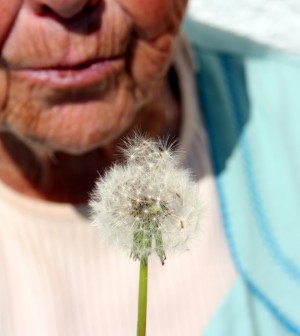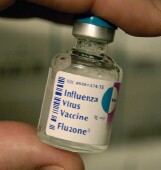- Could Your Grocery Store Meat Be Causing Recurring UTIs?
- Are You Making This Expensive Thermostat Error This Winter?
- Recognizing the Signs of Hypothyroidism
- 10 Strategies to Overcome Insomnia
- Could Artificial Sweeteners Be Aging the Brain Faster?
- Techniques for Soothing Your Nervous System
- Does the Water in Your House Smell Funny? Here’s Why
- Can a Daily Dose of Apple Cider Vinegar Actually Aid Weight Loss?
- 6 Health Beverages That Can Actually Spike Your Blood Sugar
- Treatment Options for Social Anxiety Disorder
High-Dose Flu Vaccine May Better Protect the Elderly: Study


The high-dose flu shot protects seniors better than the standard dose does, a new study finds.
About one in four cases of flu in older patients vaccinated with the standard dose could be prevented if the high-dose vaccine were used instead, the researchers reported.
“The study demonstrated a 24 percent reduction in influenza illness among the participants who received the high-dose vaccine compared to those who received the standard dose,” said study co-author Dr. David Greenberg, vice president for scientific and medical affairs and chief medical officer for Sanofi Pasteur U.S., the maker of the Fluzone High-Dose vaccine and funder of the trial.
This protection is over and above the protection one gets from the standard flu shot, Greenberg noted.
He pointed out that the added protection is essential for older people. “People 65 and older account for about 60 percent of hospitalizations due to flu and about 90 percent of deaths that are flu-related,” he said.
Older people tend to have weaker immune systems and don’t respond as well to the standard flu shot, Greenberg explained. The high-dose vaccine was designed to address these weaknesses, he said.
Fluzone High-Dose vaccine is an inactivated influenza vaccine containing four times the vaccine found in the standard dose, Greenberg explained.
Dr. Len Horovitz, a pulmonary specialist at Lenox Hill Hospital in New York City, said he recommends the high-dose vaccine for his older patients. “People 65 and older do not process vaccines as well as younger people,” he explained.
“Protection from the flu vaccine is not 100 percent — it’s about 60 percent effective,” Horovitz said. “But if you can increase it by 15 or 20 percent, that’s something.”
Dr. Ambreen Khalil, an infectious diseases specialist at Staten Island University Hospital in New York City, said she is also inclined to give the high-dose vaccine to her older patients.
“We did have a lot of vaccine failure this year. A lot of patients got sick even after taking the vaccine, so if we can do something better for these patients then I would consider doing that for my patients,” Khalil said.
Fluzone High-Dose is approved for people 65 and older, but is not recommended for people who have had a severe reaction to the flu vaccine in the past, according to the U.S. Centers for Disease Control and Prevention.
The CDC does not specifically recommend Fluzone High-Dose for all seniors. Rather, the agency recommends “flu vaccination as the first and most important step in protecting against flu viruses.”
The report was published Aug. 14 in the New England Journal of Medicine.
For the study, researchers randomly assigned nearly 32,000 men and women aged 65 and older to receive either the high-dose flu shot or a regular dose.
Greenberg and his colleagues found that people given the high-dose shot produced more antibodies against the flu than those given the standard dose.
Greenberg also noted that the high-dose vaccine may help prevent hospitalizations, pneumonia, heart and lung problems, doctor visits and medication use.
More information
Visit the U.S. Centers for Disease Control and Prevention for more on the flu.
Source: HealthDay
Copyright © 2026 HealthDay. All rights reserved.










